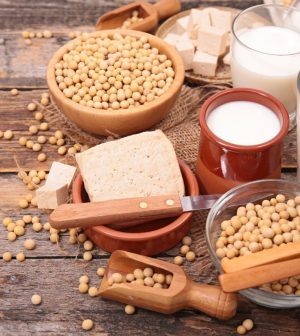- Could Your Grocery Store Meat Be Causing Recurring UTIs?
- Are You Making This Expensive Thermostat Error This Winter?
- Recognizing the Signs of Hypothyroidism
- 10 Strategies to Overcome Insomnia
- Could Artificial Sweeteners Be Aging the Brain Faster?
- Techniques for Soothing Your Nervous System
- Does the Water in Your House Smell Funny? Here’s Why
- Can a Daily Dose of Apple Cider Vinegar Actually Aid Weight Loss?
- 6 Health Beverages That Can Actually Spike Your Blood Sugar
- Treatment Options for Social Anxiety Disorder
Soy Foods May Be Good for Kids’ Brains

A diet rich in soy may help kids in the classroom, new research suggests.
It found that 7- to 13-year-olds whose diets included more isoflavones were more attentive and had better thinking abilities. Soybeans and soy products are rich in isoflavones, which have been shown to improve memory in adults. Research in children has been lacking.
The new study — which was presented recently at the annual meeting of the American Society for Nutrition (ASN) in Chicago — begins a deeper look at the brain benefits of soy in kids. Research presented at meetings is considered preliminary until published in a peer-reviewed journal.
“Soy foods are often not a regular part of children’s diets in the United States,” said Ajla Bristina, a doctoral student at the University of Illinois Urbana-Champaign. “Our study adds evidence of the importance of nutrients found in soy foods for childhood cognition.”
Her team looked at data from a study that included 128 children. They calculated each child’s intake from weeklong diet records, including amounts of vitamins, micro- and macronutrients and isoflavones.
Researchers then used a set of paper and pencil tests, adjusted for grade level, to gauge children’s intellectual ability. Brain-wave activity was recorded as kids completed a computerized matching exercise to gauge attention span and mental speed.
While participants tended to consume low amounts of isoflavone-rich soy, those who ate more responded more quickly to the attention tasks and processed information faster.
Researchers found no link between soy intake and general intellectual ability.
On average, participants ate 1.33 milligrams (mg) of isoflavones a day, which researchers described as “relatively low.”
“Soy consumption for individual participants ranged from 0 to 35 mg/day,” Bristina said in a meeting news release. “To put this into perspective, an 8 fl. oz. serving of soy milk provides about 28 mg of isoflavones, a serving of tofu provides about 35 mg and half a cup of steamed edamame provides about 18 mg of isoflavones.”
Snacks like roasted edamame, soy nuts or soy milk are a good way to add soy into the diet, she said. Tofu, tempeh or soy-based nuggets are also good.
Bristina said studies like this one are a first step.
“To better understand the effects of eating soy foods on children’s cognitive abilities and the precise amount of isoflavone intake necessary to elicit faster response times will require intervention approaches,” she said.
The team recently began a clinical trial to investigate the effects of soy foods on thinking abilities, sex hormones, metabolic health and gut health.
More information
The National Center for Complementary and Integrative Health has more about the benefits of soy.
SOURCE: American Society for Nutrition, news release, July 2, 2024
Source: HealthDay
Copyright © 2026 HealthDay. All rights reserved.










